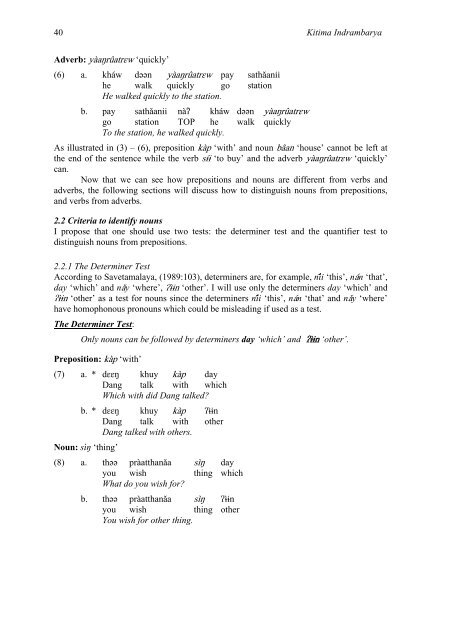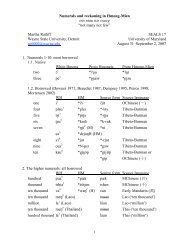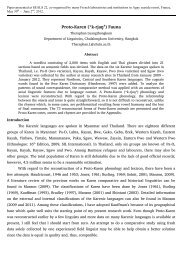proto-southwestern-tai revised: a new reconstruction - seals 22
proto-southwestern-tai revised: a new reconstruction - seals 22
proto-southwestern-tai revised: a new reconstruction - seals 22
You also want an ePaper? Increase the reach of your titles
YUMPU automatically turns print PDFs into web optimized ePapers that Google loves.
40 Kitima Indrambarya<br />
Adverb: yàaŋrûatrɛw ‘quickly’<br />
(6) a. kháw dəən yàaŋrûatrɛw pay sathǎanii<br />
he walk quickly go station<br />
He walked quickly to the station.<br />
b. pay sathǎanii nàʔ› kháw dəən yàaŋrûatrɛw<br />
go station TOP he walk quickly<br />
To the station, he walked quickly.<br />
As illustrated in (3) – (6), preposition kàp ‘with’ and noun bâan ‘house’ cannot be left at<br />
the end of the sentence while the verb sɨ́ɨ ‘to buy’ and the adverb yàaŋrûatrɛw ‘quickly’<br />
can.<br />
Now that we can see how prepositions and nouns are different from verbs and<br />
adverbs, the following sections will discuss how to distinguish nouns from prepositions,<br />
and verbs from adverbs.<br />
2.2 Criteria to identify nouns<br />
I propose that one should use two tests: the determiner test and the quantifier test to<br />
distinguish nouns from prepositions.<br />
2.2.1 The Determiner Test<br />
According to Savetamalaya, (1989:103), determiners are, for example, n¤¤¤ii ‘this’, nán ‘that’,<br />
day ‘which’ and nǎy ‘where’, ʔɨ̀ɨn ‘other’. I will use only the determiners day ‘which’ and<br />
ʔɨ̀ɨn ‘other’ as a test for nouns since the determiners n¤¤¤ii ‘this’, nán ‘that’ and nǎy ‘where’<br />
have homophonous pronouns which could be misleading if used as a test.<br />
The Determiner Test:<br />
Only nouns can be followed by determiners day ‘which’ and ʔɨ̀ɨn ‘other’.<br />
Preposition: kàp ‘with’<br />
(7) a. * dɛɛŋ khuy kàp day<br />
Dang talk with which<br />
Which with did Dang talked?<br />
b. * dɛɛŋ khuy kàp ʔɨ̀ɨn<br />
Dang talk with other<br />
Dang talked with others.<br />
Noun: sìŋ ‘thing’<br />
(8) a. thəə pràatthanǎa sìŋ day<br />
you wish thing which<br />
What do you wish for?<br />
b. thəə pràatthanǎa sìŋ ʔɨ̀ɨn<br />
you wish thing other<br />
You wish for other thing.





